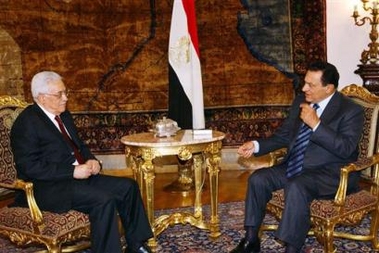|
Israel shuts down Hamas charities
(AP)
Updated: 2005-09-29 09:07
Israel shut down charities with ties to Hamas across the West Bank on Wednesday as it widened a five-day offensive against Palestinian militants despite their pledges to stop firing rockets at Israel.
Israeli aircraft fired missiles at several Gaza targets early Wednesday, knocking out power in Gaza City for most of the night, damaging several buildings and destroying an overpass. Troops also fired live artillery shells into northern Gaza for the first time, hitting an area the army said was used to fire rockets.
A senior army officer said Israel might shell Palestinian towns — after first giving warning — and Defense Minister Shaul Mofaz said Israel was trying to teach the militants it will not tolerate any more attacks from Gaza following its recent pullout from the area.
"It needs to be clear to them that we mean every word we say," Mofaz said.
Palestinian leader Mahmoud Abbas traveled to Cairo to try to enlist Egyptian President Hosni Mubarak, a key mediator in the conflict, to help stop the crisis from escalating.
In a new phase of its offensive, Israel closed down 15 offices across the West Bank, including those of charities linked to local mosques. Israel said the offices were used to distribute money to the families of suicide bombers and militants jailed by Israel.
Ghazi Hamad, a Hamas commentator, said the group has a support network extending from east Asia through the Persian Gulf to Europe, and that Israel would not be able to stop the flow of money and donations. "Israel is monitoring, but it can't monitor every channel," he said, suggesting some of the money is brought in through smuggling tunnels under the Gaza-Egypt border.
In addition to its militant wing, which is responsible for hundreds of attacks on Israel in recent years, Hamas also runs soup kitchens, clinics and other charities that have helped make it popular among poor Palestinians.
In one raid Wednesday, Israeli troops took computers and documents from the Tulkarem office of Zaka, a charity network that has been linked to Hamas and collects donations from mosques.

In this photograph released by the Palestinian Authority, Palestinian leader Mahmoud Abbas, left, meets with Egyptian President Hosni Mubarak in Cairo, Egypt, Wednesday, Sept. 28, 2005, to discuss the critical events in Gaza after the Israeli withdrawal and to seek Egypt's good relations with Israel and other parties to ease the situation. [AP] |
"This is a war against the groups that work to help the needy, those who need food, the orphans," said Bilal Abu Omar, the head of the Zaka office.
The Israeli offensive was triggered by a rocket barrage launched by Gaza militants at Israel, including the border town of Sderot, over the weekend. Since then, militant groups said they would halt attacks and renewed their commitment to a 7-month-old truce, but Israel said it would press ahead with the campaign.
"We will step up our operations and our response until they stop the rocket fire," Mofaz said in an interview with Channel Two TV. "So long as there is no quiet in Sderot, there will be no quiet in Gaza."
Mofaz said that since Israel pulled out of Gaza after 38 years of occupation, the nation would no longer tolerate any attacks from there.
A senior Israeli army commander did not rule out shelling Gaza towns. "We will warn the population, make sure that they leave the area, while we target the sources of rocket fire," said Maj. Gen. Israel Ziv, the army chief of operations.
Israel also appeared to be using the offensive as an opportunity to deliver a major blow to Hamas, which had been largely off-limits after it agreed to an informal truce in February.
Hamas accused Israel of trying to weaken it politically before Palestinian parliamentary elections in January. Israel arrested 24 more suspected militants in the West Bank overnight, bringing the number detained since the weekend to more than 400, including dozens of Hamas candidates.
Hamas is expected to make a strong showing in the parliament vote and in local elections to be held in more than 100 towns and villages Thursday.
Israel has repeatedly demanded Abbas disarm Hamas and insisted it should not be able to field candidates in the parliamentary elections.
"Hamas is running on the platform of terror and murder of Israeli civilians," said David Baker, an official in Israeli Prime Minister Ariel Sharon's office. "Would anyone in the United States allow al-Qaida to run in elections?"
Abbas has refused to crack down on Hamas, saying it would start a civil war.
A meeting between Sharon and Abbas, tentatively set for Sunday, was postponed, apparently because of the flare-up.
Meanwhile, Sharon adviser Eyal Arad and Cabinet minister Tzahi Hanegbi said Israel could withdraw from some parts of the West Bank and annex others if peace efforts remain bogged down. The comments marked the first time confidants of the prime minister talked in public about potential additional unilateral moves by Israel following the Gaza pullout.
Sharon's office later said Israel remained committed to a negotiated peace deal with the Palestinians.
|